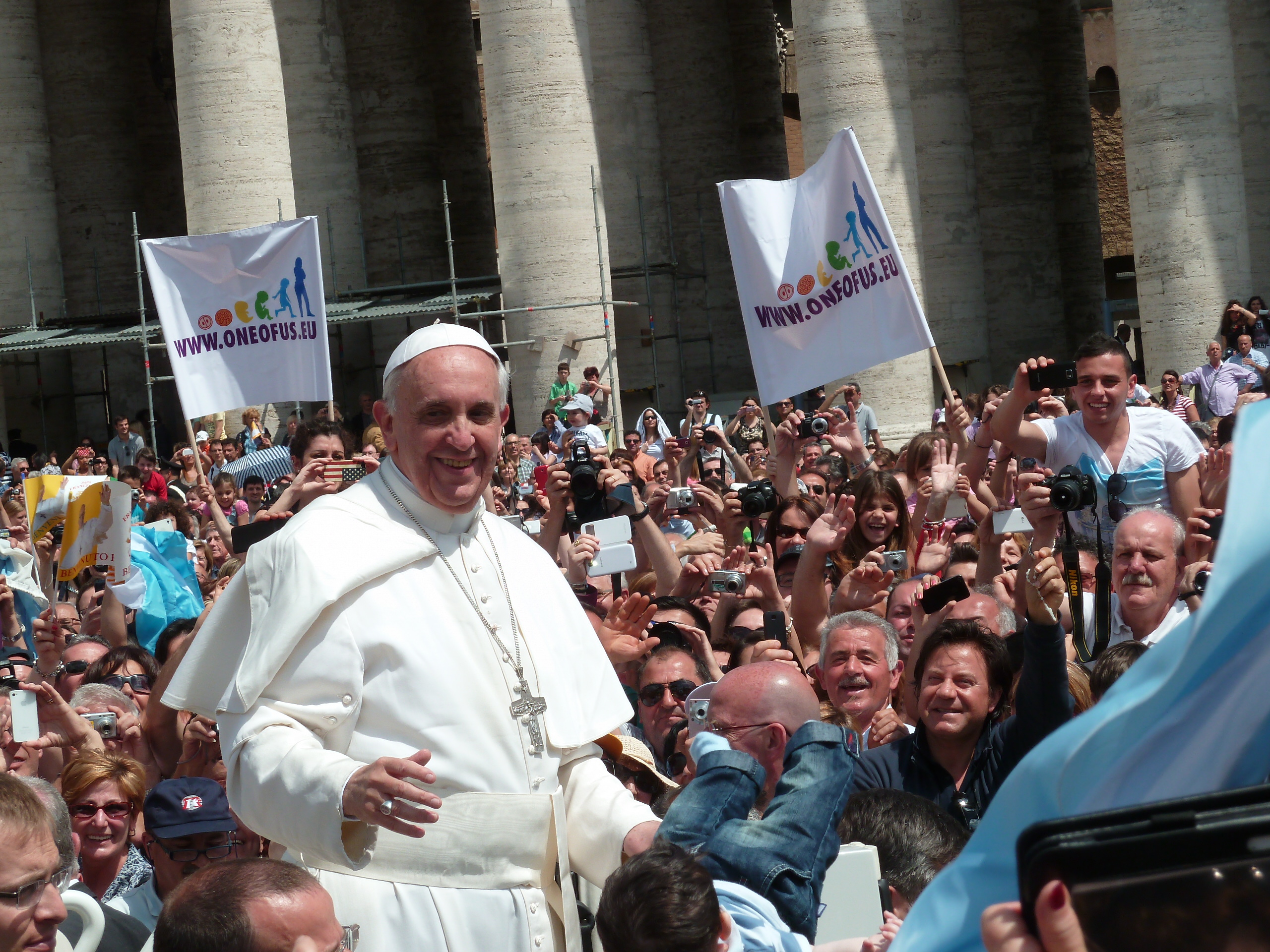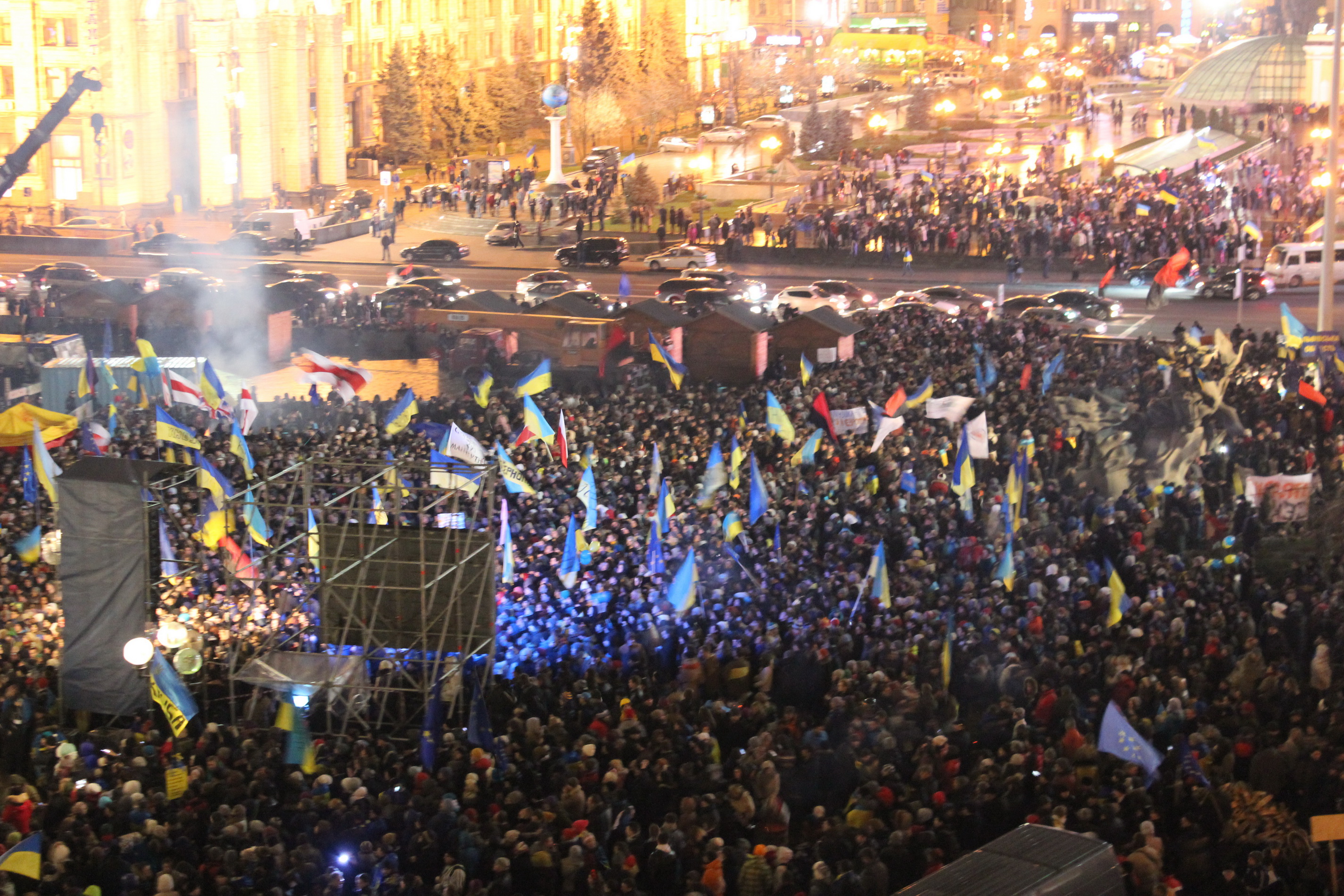Vor hundert Jahren, am 18.12.1913, wurde Willy Brandt (1913-1992) als Herbert Frahm in Lübeck geboren, der (nicht nur) in seiner Regierungszeit (1969-1974) polarisierende und wohl umstrittenste Bundeskanzler der Bundesrepublik Deutschland, der erste Sozialdemokrat in diesem Amt. Ihm folgte mit Helmut Schmidt (*1918 in Hamburg) der letzte eigentliche sozialdemokratische Kanzler der BRD ins Amt (1974-1982). Schmidt feierte in diesen Tagen einen runden, hohen Geburtstag, nämlich am 23. Dezember seinen 95. Brandt und Schmidt polarisierten und politisierten, die heutige Bundesregierung Angela Merkels dagegen ist so unpolitisch wie keine deutsche Regierung zuvor und vom außen-, europa- und wirtschaftspolitischem politischen Gestaltungswillen Brandts und Schmidts weit entfernt. Deutschland hat derzeit keine signifikante Außenpolitik und ist von Nicht-Politik, von Scheingefechten auf "Nebenkriegsschauplätzen", geprägt.
 |
| Willy Brandt (damals Bundeskanzler) und Helmut Schmidt (damals Bundesfinanzminister) auf dem SPD-Parteitag in Hannover, April 1973 |
Die beiden Sozialdemokraten und Hanseaten waren die letzten deutschen Kanzler, die die Bonner Republik in einer Zeit der starken politischen Polarisierung zwischen Ost und West, zwischen Links und Rechts, einer Zeit gesamtgesellschaftlicher Mobilisierung und Politisierung (Bürgerrechts- (Friedens, Frauen-, Ökologie-) Bewegung, 68er, Vietnamkrieg, Rote Armee Fraktion/“Deutscher Herbst“) regierten, vor der unpolitischeren Ära der 1980er Jahre. Brandt, der mit seinem Kniefall in Warschau am 7. Dezember 1970 einen sehr großen Beitrag zur europäischen, in diesem Fall spezifisch deutsch-polnischen Versöhnung leistete, nach den deutschen Verbrechen im Zweiten Weltkrieg dreißig Jahre zuvor, erhielt ein Jahr später, 1971, den Friedensnobelpreis für seine in Warschau symbolisch begonnene Annäherungspolitik („Neue Ostpolitik“). Schmidt initiierte mit dem französischen Präsidenten Giscard d'Estaing die Gründung des Weltwirtschaftsgipfels („G7“, heute „G 8“-Gipfel) 1975 sowie des Europäischen Währungssystems und der Europäischen Währungseinheit (EMS/ECU) 1979 (die elf bzw. zwanzig Jahre später als Europäische Wirtschafts- (EMU) und Währungsunion (Euro), wenn auch fehlerhaft, verwirklicht wurden).
Von derlei (außen- und europa-) politischem Gestaltungswillen, von derlei wirtschaftspolitischer Initiative ist im Deutschland des Spätjahres 2013 wenig zu spüren. Der Zeitgeist ist (genauso wie das politische Personal) mehr denn je unpolitisch. Angela Merkel (*1954, CDU), nun seit mehr als acht Jahren (November 2005) im Amt, ist die unspektakulärste und innerhalb Deutschlands wohl in der breiten Masse unumstrittenste, aber auch unpolitischste Kanzlerin. Die Taktik der Nicht-Politik und des „Aussitzens“ in krisenhaften Situationen statt echtem politischem Handeln übernahm sie erfolgreich von Helmut Kohl (*1930), der u.a. dadurch 16 Jahre im Amt blieb (1982-1998). In diesen Tagen beginnt die dritte Amtszeit der zur „Ewigen Kanzlerin“ avancierenden Regierungschefin (nur Kohl und Konrad Adenauer (14 Jahre, beide auch CDU) regierten länger). Gestützt von einer Großen Koalition ihrer Unionsfraktion und der SPD (fast 80% der Abgeordneten) und parlamentarisch nur einer Mini-Opposition aus Links- und Grünen-Fraktion (gut 20% der Abgeordneten) gegenüber stehend, spiegeln die Merkel'schen Mehrheitsverhältnisse im Bundestag das „Ende der Politik“ und den Zeitgeist einer zunehmend entpolitisierten politischen Klasse exemplarisch wider. „Aussitzen“ (Kohl) oder „Politik der ruhigen Hand“ (Gerhard Schröder (SPD), * 1944, regierte 1998-2005) sind ebenso wie das Merkel'sche Nicht-Handeln, seit dreißig Jahren Teil der (nicht-)politischen (Regierungs-) Kultur und -Praxis der Republik, und oft überließ so die Politik den Märkten das Spielfeld, einer Entwicklung hin zu einer „marktkonformen Demokratie“, die Colin Crouch als „Postdemokratie“ beschreibt, Vorschub leistend. Wenn „reformiert“ wurde, dann nur im selben Sinne der Postdemokratisierung bzw. Entpolitisierung der wirtschaftlichen Sphäre; „Reform“ ist im euphemistischen Neusprech der letzten Jahrzehnte synonym mit Deregulierung, Prekarisierung, Sozialabbau.
Man kann eine Große Koalition natürlich im Positiven grundsätzlich als die Manifestation eines demokratisch-inklusiven, auf Kompromiss und Konsens ausgerichteten Politikstils befürworten; zu befürchten steht aber, dass die SPD, die wie es nun überall zu lesen ist, die Koalitionsverhandlungen zwar „gewonnen“ hat, am Merkel'schen Primat der Nicht-Politik über die Politik nichts oder nicht viel ändern wird. Die Alternative einer weniger mächtigen, aber „politischeren“ Koalition der Sozialdemokraten mit den Grünen und der Linkspartei stünde bereit; die SPD hat diese aber – zumindest für diese Legislaturperiode noch - zugunsten einer „unpolitischen“ Großen Koalition verworfen. Ob ihr dies in den nächsten Jahren nützen oder schaden wird, wird sich zeigen. Die Sozialdemokratische Partei Deutschlands hat aber heute keinen wie Willy Brandt in ihren Reihen, der wirklich „mehr Demokratie wagen“ könnte.
"Solche demokratische Ordnung braucht außerordentliche Geduld im Zuhören und außerordentliche Anstrengung, sich gegenseitig zu verstehen. Wir wollen mehr Demokratie wagen. Wir werden unsre Arbeitsweise öffnen und dem kritischen Bedürfnis nach Information Genüge tun. Wir werden darauf hinwirken, dass nicht nur durch Anhörungen im Bundestag, durch ständige Fühlungnahme mit den repräsentativen Gruppen unseres Volkes und durch eine umfassende Unterrichtung über die Regierungspolitik jeder Bürger die Möglichkeit erhält, an der Reform von Staat und Gesellschaft mitzuwirken." (erste Regierungserklärung Brandts, 28. Oktober 1969)
Zwar nicht ganz so offensichtlich wie in Österreich, wo in der Neuauflage der fast schon „ewigen“ Wiener Großen Koalition das eigenständige Wissenschaftsministerium abgeschafft und dieser Bereich dem Wirtschaftsressort untergeordnet wurde, aber doch auch in Deutschland für informierte Bevölkerungsgruppen greifbar ist, dass "Fühlungnahme" und "Zuhören" heute eben nicht erfolgt und Mitwirkung heute eben nicht erwünscht ist, dass das Primat der Demokratie, der gewählten Politik und der (theoretisch unabhängigen und humanistischen) Bildung, dem Primat ungewählter Wirtschaftsinteressen und der Ausbildung von „Humankapital“ untergeordnet wird.
Breite Schichten der Bevölkerung in Deutschland empfinden dies jedoch scheinbar nicht als gravierend, so lange sie (für sie subjektiv) nicht direkt und unmittelbar davon tangiert sind bzw. durch die Prioritätensetzung der Mainstream-Medien (und z.B. auch des scheidenden Innenministers Friedrich) andere Sündenböcke propagiert werden („Pleite-Griechen“, Abstempelung aller einwandernden Bulgaren und Rumänen als kriminell). Damit kann man gleich zwei Fliegen mit einer Klappe schlagen, denn sowohl die „in Brüssel“ (die die Grenzen öffnen) als auch „die Ausländer“ (die dadurch, natürlich nur um „uns“ auszunutzen, natürlich „massenhaft“ zu „uns“ kommen) werden so als Feindbilder aufgebaut. Dass die westlichen Staaten, allen voran Deutschland, von der Erweiterung des Wirtschaftsraums nach Osten profitieren, durch den Zugriff auf billige Arbeitskraft und Märkte, wird, genauso wie der in Deutschland demographisch bedingt bestehende Bedarf an Zuwanderern (z.B. im Bereich der (Alten-) Pflege), nicht priorisiert; dass in einer angeblich von „Freiheit“ geprägten Ideologie konsequenterweise diese neben der viel beschworenen Freiheit für die Märkte und Waren auch Freizügigkeit für die Arbeitskraft (d.h. Arbeiter) einschließen muss, blenden die Konservativen in dieser Debatte geflissentlich aus; „nationale“ Grenzen werden, nicht nur in Großbritannien, beim Thema Zuwanderung wieder hochgezogen, geht es um Finanz- und Warenströme, überwinden diese die Grenzen jedoch ungehindert und unreguliert.


